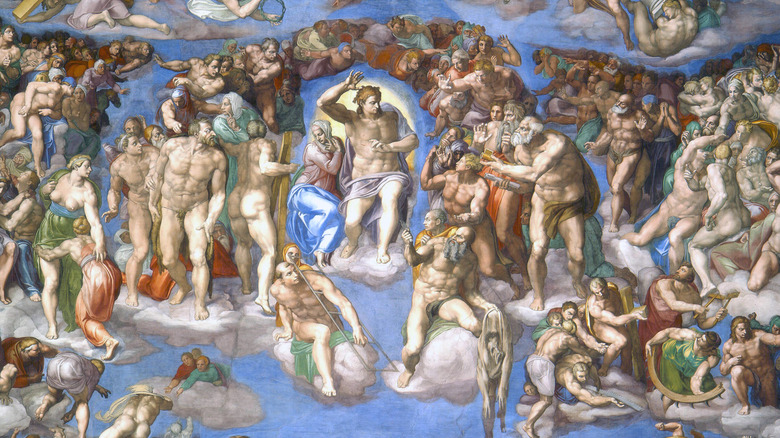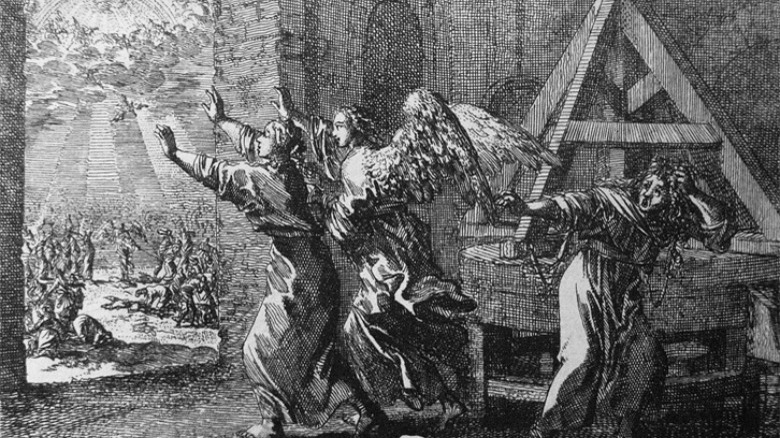What Does The Bible Say About The Rapture?
The rapture — the religious idea that at some future time Jesus Christ will return to Earth and all faithful Christians, both living and dead, will rise to meet him in the sky before being welcomed eternally into Heaven — is a pervasive concept in the modern understanding of Christianity, spread largely through television evangelists, ubiquitous religious tracts, and even pop culture, such as the "Left Behind" novels and movies and, somewhat more obliquely, "The Leftovers." But what exactly does the Bible itself have to say about the rapture?
Well, the short answer is "nothing." As the Encyclopedia Britannica explains, the word "rapture" doesn't appear anywhere in the New Testament. That's not to say that no similar word is used to explain such a concept; the Apostle Paul's First Epistle to the Thessalonians says "we ... will be caught up together with them in the clouds," which in the Latin translation of the original Greek is the word rapiemur, another form of the verb that gives us "rapture," which means "seize" or "tear away." The current conception of the rapture doesn't appear in the Bible, but rather arose out of developments in thought during the Great Awakenings of the 18th and 19th centuries. It's also important to understand that the rapture is far from a universally held Christian belief, being prominent primarily among Evangelical Protestants and not other denominations.
Biblical basis for the rapture
However, just because the Bible doesn't literally say, "Jesus will summon dead bodies into the sky just before all the bad people get punished for 1,000 years and this will be called 'the Rapture'" doesn't mean that there's no scriptural basis for the idea. As TIME explains, all four canonical gospels talk about the idea of a time when the living and the dead will all be gathered together and judged before being sent to their eternal destiny, with the righteous and the unrighteous being separated like sheep and goats. The Gospel of Mark describes Jesus "coming in the clouds with great power and glory," and the Gospel of Matthew envisions a scene of two men standing in a field, with one being taken and one being left. The primary source for ideas about the rapture, however, comes from Paul's First Epistle to the Thessalonians, chapter 4, the one that describes the faithful as being "caught up in the clouds" with the returned Christ following a trumpet sounding.
But while the resurrection of the dead and a Judgment Day for everyone who has ever lived are pretty unambiguously part of the Bible's message, a physical levitation into the sky is less universally accepted. The idea of a physical rapture was popularized in the 1830s by an Evangelical British minister following visions of Christ's Second Coming by a young man from Scotland. The idea spread to American Evangelicals in the early 20th century, and the doomsday-minded media of American evangelists led to the idea becoming, as TIME calls it, a "cultural touchstone."
How the rapture fits into the end times
The idea of the rapture is far from universally believed, even among Christians. Part of the reason for this is that one of the murkiest quagmires of Christian theology you can wade into is the study of the end times, or eschatology, as it is known. While most Christians believe that Christ will return to Earth, as Slate explains, the Second Coming and the rapture are not always synonymous. The key evolution of the idea is a concept called premillennial dispensationalism, popularized by that 19th century British minister mentioned above. Dispensationalism is the idea that God has treated humans differently at different points in history, and that history can be broken up into different eras based on the way God has dispensed his plan for humanity. For example, the idea is that God treated the world differently before the Flood than after, and after he gave the law to Moses, and so on.
The idea is that the current era will be followed by a seven-year period of tribulation for non-believers, after which Jesus will come back with the righteous and rule over a thousand-year era of peace known as the Millennium. What makes the view premillennial is the idea that the rapture will occur before the tribulation, and the Second Coming sees Christ and the church return together for the Millennium, making the rapture and the Second Coming two different events.
Too many millennialisms
Savvy readers will probably note to themselves, "The existence of premillennial eschatology implies the existence of postmillennial eschatology." Boy howdy, you are right. As the BBC explains, postmillennialists believe that we're already in the Millennium, which began at Christ's resurrection, and that we are slowly moving toward the consummation of God's kingdom, which will end with Christ's Second Coming. Then there's amillennialists, who believe that the Millennium is a metaphor that represents the era of Christ's church, i.e., right now. It's not a literal 1,000 years, there's no literal seven-year tribulation, and, perhaps most notably, no rapture. When, in these views, do good Christians get taken up to Heaven? Well, never. In these views, Christians don't get a "get out of tribulation free" card to enjoy time with Jesus before the end times. They have a social and moral obligation to improve the world and make it a more just and peaceful place in expectation of Christ's return.
As it stands, most Christian denominations do not teach that some people will be taken up to Heaven while the majority of humanity is left to suffer a tribulation prior to the Second Coming of Christ. Despite the prevalence of the idea in popular consciousness, Catholics, Eastern Orthodox, Anglicans/Episcopalians, Methodists, Presbyterians, Lutherans, and many others do not subscribe to the idea of a bodily rapture and tribulation.



